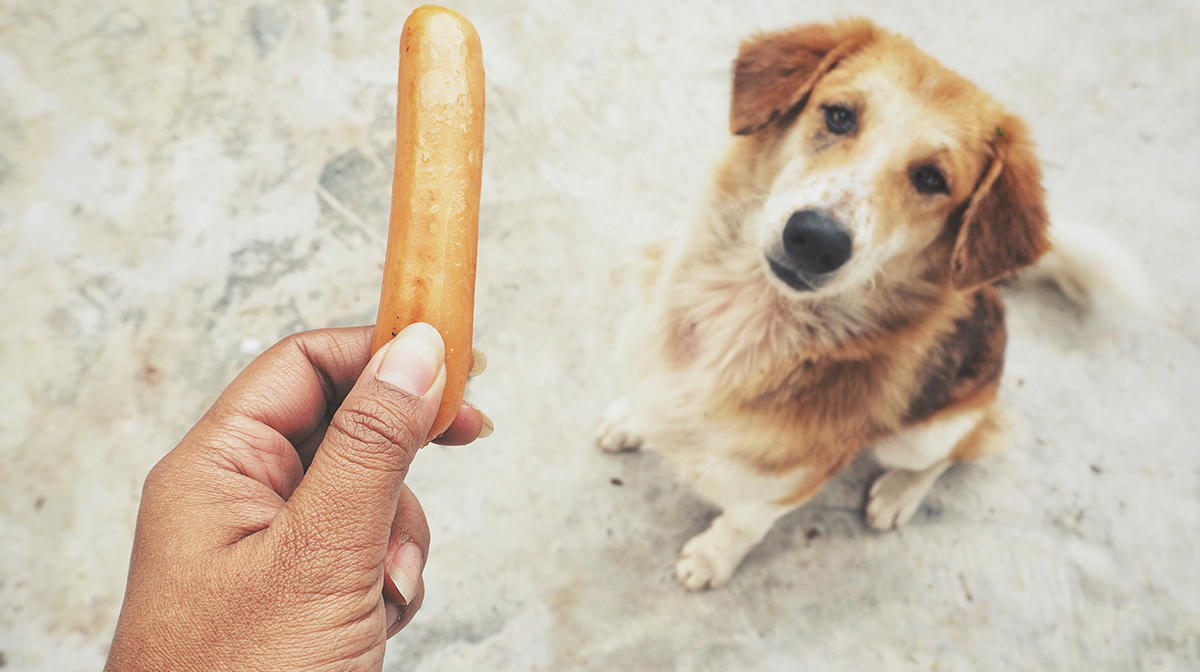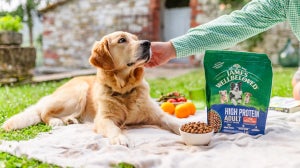
You're preparing Sunday dinner when your dog appears at your feet, drawn by the rich aroma of roasting pork. Those hopeful eyes look up at you, and the question crosses your mind: Can dogs eat pork safely?
The answer depends on several important factors. While dogs can eat pork under the right conditions, there are significant safety considerations every pet owner should understand. Some types of pork pose serious health risks, while others can be perfectly safe when prepared correctly.
Your dog's individual needs, size, and health status all play a role in determining whether pork is suitable for them. This guide explains when pork is safe for dogs and when you should avoid it completely.
Is Cooked Pork Safe for Dogs?
Plain, cooked pork is safe for dogs to eat, as long as you keep it simple and leave off the bells and whistles people tend to cook with. When properly prepared, cooked pork can make an occasional treat for your furry friend. The key lies in careful preparation and choosing the right cuts. If you plan to feed your dog pork, the best choices are lean cuts such as trimmed tenderloin or ultra-lean mince. These cuts provide protein benefits without excessive fat that can upset your dog's digestive system.
Your dog's safety depends entirely on how you prepare the pork. Cook it thoroughly without any seasonings, spices, or sauces.Make sure to cook raw pork thoroughly to kill harmful bacteria and parasites that could make your dog seriously ill. Knowing whether dogs can eat cooked pork safely depends on following these temperature guidelines
Safe preparation guidelines for cooked pork:
Choose lean cuts like tenderloin or ultra-lean mince
Cook thoroughly to proper internal temperatures (160°F for ground pork, 145°F for steaks/chops)
Remove all visible fat before cooking
Never add seasonings, especially onions or garlic, which are toxic to dogs
Avoid cooking with oils, butter, or sauces
Let the meat cool completely before offering it to your dog
Serve only small portions as an occasional treat, not a meal replacement
Remember that even safely prepared pork should only be given in moderation. If you are adding pork as a treat to your dog's food, make sure you reduce the overall amount you are feeding to avoid the risk of obesity. Too much of any new food can upset your dog's stomach, so introduce pork gradually and watch for any digestive issues. When considering pork alongside other options, our guide on human foods for dogs helps you understand which human foods can safely become occasional treats. For more comprehensive guidance on what foods are appropriate for your pet, explore our detailed guide on what dogs can eat.
Can I give my dog pork bones
The simple answer is no. Pork bones, whether raw or cooked, are likely to splinter and crack when your dog chews on them. This creates serious safety hazards that far outweigh any potential benefits. Pork bones are brittle (especially if cooked) and can splinter in your dog's mouth or digestive tract, causing punctures, damage to the cheeks or gums, or other serious health concerns.
Dogs can’t eat raw pork bones as it carries significant risks. Although raw pork bones are more durable than cooked bones, they can be too hard for your dog's teeth and contribute to dental problems, like broken teeth and damaged gums. The size of pork bones also creates choking hazards
Your dog might attempt to swallow small pieces of the pork bone, which could lead to choking, intestinal blockages, or damage to the esophagus or intestines. If you want to provide your dog with the pleasure of chewing, consider specially designed dental chews that offer safety alongside the satisfaction they're seeking.
Can Dogs Eat Raw Pork?
No, dogs can’t eat raw pork. Raw or undercooked pork could make your dog very ill due to serious health risks that simply aren't worth taking. The primary concern when asking if dogs can eat raw pork centres around the food safety risks of handling and eating uncooked meat including bacterial infections from pathogens such as Salmonella, E-Coli and Listeria as well as a dangerous parasite called Trichinella spiralis. This roundworm causes trichinosis (also called trichinosis), a disease that enters your dog's body through their gastrointestinal system when they eat infected meat.
Such bacterial infections create similar symptoms to parasitic infections and can spread to humans through contaminated surfaces or direct contact. Pet owners wondering if dogs can eat raw pork should understand these bacterial risks extend beyond parasites.
Always cook pork thoroughly before giving it to your dog, as proper cooking temperatures kill both parasites and harmful bacteria that thrive in raw meat.
Symptoms and Consulting a Vet if your Dog has Eaten Raw Pork
If your dog has eaten raw pork, watch for these warning signs and contact your vet immediately if they appear:
Digestive symptoms: Vomiting, diarrhoea, abdominal pain, loss of appetite
Behavioural changes: Lethargy, reluctance to move, signs of discomfort
Physical symptoms: Weight loss, dehydration, fever
Severe reactions: Difficulty breathing, seizures, collapse
When to seek immediate veterinary care
Contact your vet right away if your dog shows any symptoms after eating raw pork, especially vomiting or diarrhea lasting more than 24 hours. Early intervention improves treatment outcomes significantly. If you're unsure about symptoms or need guidance on when to consult a vet, professional advice can prevent serious complications.
Can Dogs Eat Processed Pork?
Ham, bacon, sausages, and other processed pork products should be given only in extremely small amounts as rare training treats. These processed meats pose multiple health risks that make them unsuitable for regular consumption. Bacon and ham are cured in high amounts of salt and contain elevated fat levels that many dogs struggle to digest properly. Many pet owners asking can dogs eat pork don't realise that processed varieties carry significantly higher risks than fresh cuts.
The high sodium content in processed pork can lead to excessive thirst and dehydration. If your dog is drinking too much water after consuming salty foods, this indicates their body is working overtime to process the excess sodium. You may even catch yourself wondering if your dog is overweight or just bloated. The elevated fat content creates even more serious concerns, as fatty foods can trigger pancreatitis, a painful inflammation of the pancreas that requires immediate veterinary treatment.
Understanding Dogs' Dietary Needs
Your dog's digestive system has evolved to process specific types of nutrients in particular ways, making some foods beneficial while others can be harmful. Dogs require a balanced diet that provides complete proteins, healthy fats, carbohydrates, vitamins, and minerals in precise proportions. When considering whether pork is bad for dogs, the answer depends entirely on preparation, quantity, and your individual pet's health status.
Unlike humans, dogs cannot safely consume all the same foods we enjoy. Their bodies process fats differently, making them more susceptible to pancreatitis from high-fat foods. They also lack certain enzymes needed to break down specific compounds found in human food seasonings and preservatives. The question of whether dogs can eat raw pork becomes particularly important because their digestive systems, while robust in many ways, cannot safely handle the parasites and bacteria that thrive in uncooked meat.
Every dog's nutritional needs vary based on age, size, activity level, and health conditions. What works safely for one dog might cause problems for another, which is why introducing any new food, including properly prepared pork, should happen gradually and under careful observation. Ultimately, determining whether pork is bad for dogs depends on these preparation factors.
The Nutritional Value of Pork for Dogs
From a nutritional perspective, dogs can eat cooked pork when it's lean and properly prepared. Pork provides several nutritional benefits when prepared safely for canine consumption. It's a high-quality, complete protein that contains all the essential amino acids your dog needs for muscle maintenance, growth, and immune function. Pork also supplies important B vitamins, including B6 and B12, which support brain health, metabolism, and red blood cell formation. Pet owners frequently ask if pork is bad for dogs, and the answer depends entirely on the preparation method.
The mineral content in pork includes potassium and zinc, both vital for your dog's overall health. However, the nutritional value depends heavily on the cut you choose and how you prepare it. Lean cuts provide protein benefits without excessive fat, while fatty cuts can overwhelm your dog's digestive system.
Ultimately, can dogs eat cooked pork? The short answer is yes, but only when it’s lean and properly prepared to occasionally supplement a complete, balanced diet.
Find out more resources that can help you understand , so you can feel confident about every meal you share with your furry companion.
Can Dogs Eat Pork - FAQs
We get lots of questions about pork safety for dogs. These are the most common concerns that pet owners ask, with practical solutions based on veterinary guidance.
Can pork upset a dog's stomach?
Yes, pork can upset your dog's stomach, especially if it's fatty, seasoned, or given in large quantities or if the dog has a specific allergy or sensitivity to pork. Dogs can be sensitive to fatty foods, and too much fat can lead to digestive issues like vomiting, diarrhea, or even pancreatitis. Raw pork poses additional risks from parasites and bacteria that cause severe stomach upset. Even safely prepared lean pork should be introduced gradually in small amounts to avoid overwhelming your dog's digestive system. Always monitor your pet after giving them any new food.
Why is pork not recommended for dogs?
Pork isn't entirely bad for dogs, but many veterinarians advise caution due to several risk factors. Raw pork can harbour the dangerous Trichinella spiralis parasite, causing trichinosis. Pork is also higher in fat than other meats like chicken, making it harder for dogs to digest and potentially triggering pancreatitis. Many pork products contain seasonings, salt, or preservatives that are harmful to dogs. Additionally, it is never safe for a dog to eat bones but pork bones splinter easily and pose choking hazards. When prepared properly, pork can be safe in moderation but never the bones.
Why can't dogs have ham or bacon?
Ham and bacon are cured with extremely high levels of salt and contain elevated fat content that can be dangerous for dogs. The excessive sodium can cause dehydration and put strain on your dog's kidneys, while the high fat content frequently triggers pancreatitis, a serious condition requiring immediate veterinary treatment. These processed meats also contain preservatives and additives that provide no nutritional benefit. The World Health Organisation classified processed meats like bacon as carcinogens linked to cancer. Even small amounts can cause stomach upset in sensitive dogs.

Related Articles








